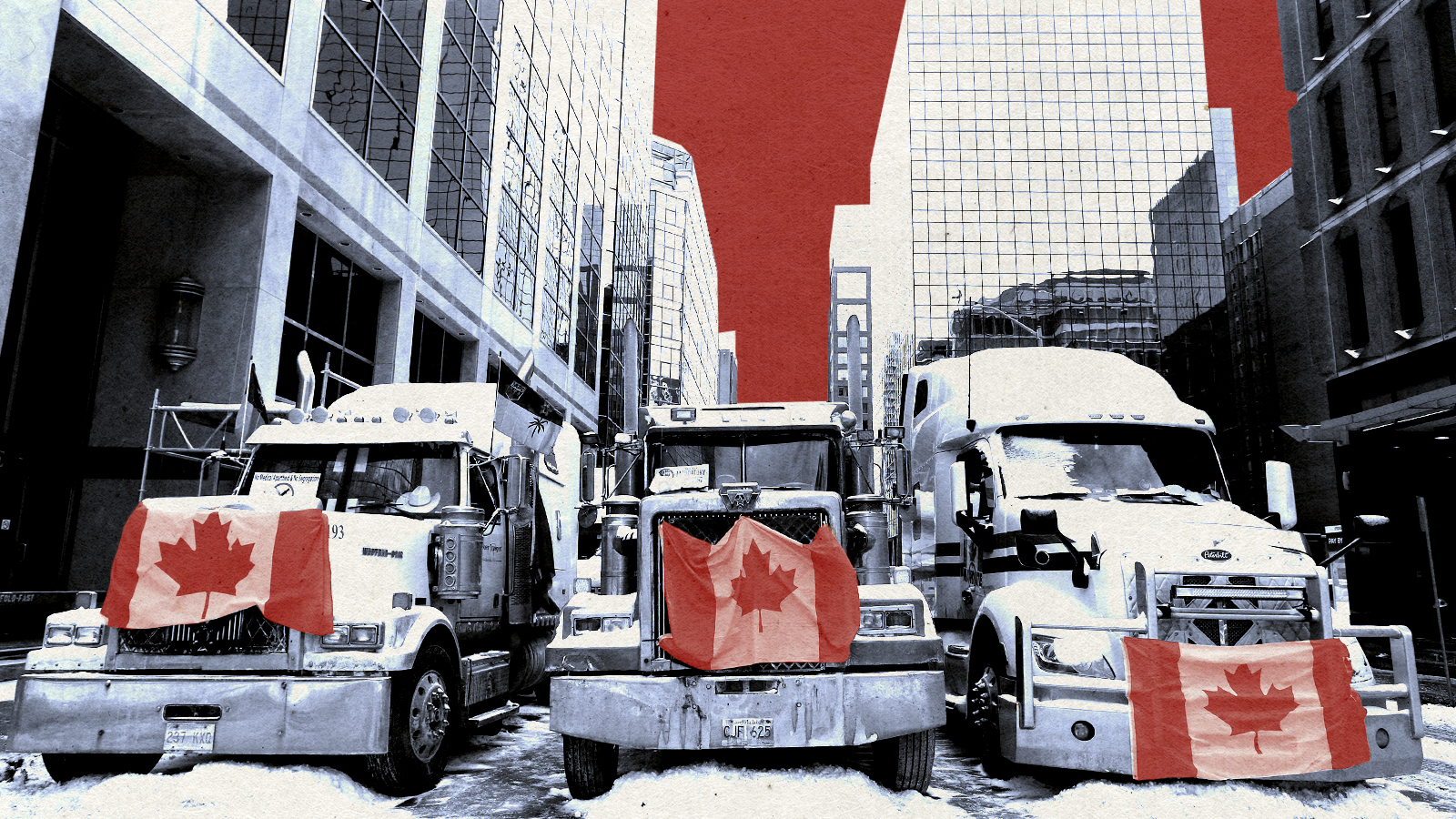Trudeau's a hypocrite about the trucker protests. He's not the only one.


A free daily email with the biggest news stories of the day – and the best features from TheWeek.com
You are now subscribed
Your newsletter sign-up was successful
In 2020, thousands of farmers from all over India traveled to the capital city of Delhi. Protesting agriculture policies they believed threatened their livelihoods, they set up encampments and clashed with police. Responding to the situation, Canadian Prime Minister Justin Trudeau urged the authorities to show restraint. "Canada will always be there to defend the right of peaceful protest," Trudeau insisted, to the annoyance of the Indian government.
Now the shoe is on the other foot. Faced with ongoing, trucker-led demonstrations against vaccine policies in Ottawa and the blockade of a major bridge to the United States, large-scale protests are trying Trudeau's patience. "Blockages, illegal demonstrations are unacceptable, and are negatively impacting businesses and manufacturers," he told Parliament on Wednesday. "It has to stop."
The inconsistency in tone, if perhaps not technical content, is fair game for criticism. Yet Trudeau's not the only one who can be accused of hypocrisy. On this side of the border, media figures and politicians have flipped the script established during the tumults of 2020. At that time, with protests for policing reform in many major cities, progressives mostly defended disruptive tactics like occupations and road shutdowns, if not actual violence, while conservatives called for harsh penalties. Now Sen. Ted Cruz (R-Texas) argues the Canadian truckers are standing up for freedom, while late-night hosts bemoan the economic and social costs.
The Week
Escape your echo chamber. Get the facts behind the news, plus analysis from multiple perspectives.

Sign up for The Week's Free Newsletters
From our morning news briefing to a weekly Good News Newsletter, get the best of The Week delivered directly to your inbox.
From our morning news briefing to a weekly Good News Newsletter, get the best of The Week delivered directly to your inbox.
Some of this shift has to do with growing enthusiasm for gonzo politics on the right. But the real explanation lies deeper. Very few people uphold consistent opinions on the justice of protest tactics, one way or the other. What matters is their assessment of the goal and participants.
That's not to say it's impossible to make principled judgments. The philosophical debate of the justification of civil disobedience that extends back to Socrates. For political purposes, though, the question is how much sympathy the truckers can attract to themselves and their cause. As Trudeau demonstrated two years ago, sometimes it's easier to admire from a distance than to confront the problem close up.
A free daily email with the biggest news stories of the day – and the best features from TheWeek.com
Samuel Goldman is a national correspondent at TheWeek.com. He is also an associate professor of political science at George Washington University, where he is executive director of the John L. Loeb, Jr. Institute for Religious Freedom and director of the Politics & Values Program. He received his Ph.D. from Harvard and was a postdoctoral fellow in Religion, Ethics, & Politics at Princeton University. His books include God's Country: Christian Zionism in America (University of Pennsylvania Press, 2018) and After Nationalism (University of Pennsylvania Press, 2021). In addition to academic research, Goldman's writing has appeared in The New York Times, The Wall Street Journal, and many other publications.
-
 9 products to jazz up your letters and cards
9 products to jazz up your letters and cardsThe Week Recommends Get the write stuff
-
 AI surgical tools might be injuring patients
AI surgical tools might be injuring patientsUnder the Radar More than 1,300 AI-assisted medical devices have FDA approval
-
 ‘Zero trimester’ influencers believe a healthy pregnancy is a choice
‘Zero trimester’ influencers believe a healthy pregnancy is a choiceThe Explainer Is prepping during the preconception period the answer for hopeful couples?
-
 Epstein files topple law CEO, roil UK government
Epstein files topple law CEO, roil UK governmentSpeed Read Peter Mandelson, Britain’s former ambassador to the US, is caught up in the scandal
-
 Iran and US prepare to meet after skirmishes
Iran and US prepare to meet after skirmishesSpeed Read The incident comes amid heightened tensions in the Middle East
-
 Israel retrieves final hostage’s body from Gaza
Israel retrieves final hostage’s body from GazaSpeed Read The 24-year-old police officer was killed during the initial Hamas attack
-
 China’s Xi targets top general in growing purge
China’s Xi targets top general in growing purgeSpeed Read Zhang Youxia is being investigated over ‘grave violations’ of the law
-
 Panama and Canada are negotiating over a crucial copper mine
Panama and Canada are negotiating over a crucial copper mineIn the Spotlight Panama is set to make a final decision on the mine this summer
-
 Iran unleashes carnage on its own people
Iran unleashes carnage on its own peopleFeature Demonstrations began in late December as an economic protest
-
 Why Greenland’s natural resources are nearly impossible to mine
Why Greenland’s natural resources are nearly impossible to mineThe Explainer The country’s natural landscape makes the task extremely difficult
-
 Trump, Iran trade threats as protest deaths rise
Trump, Iran trade threats as protest deaths riseSpeed Read The death toll in Iran has surpassed 500
